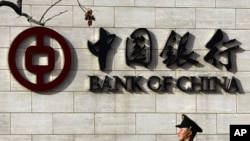Welcome again to As It Is from VOA Learning English! I’m Mario Ritter in Washington.
Today, we hear about the growing influence of shadow banking in China. Lending outside the official banking system is causing some officials to be concerned. We hear from an expert on the subject.
But first we hear about a former leader of the Chinese Communist Party. Media from around the world have been following the government’s case against him.
Bo Xilai was once the powerful Communist Party chief in Chongqing, China. Last week, his trial came to an end with government lawyers calling for severe punishment. The trial was unusual for many reasons. Kelly Jean Kelly has more on the story from VOA reporter Bill Ide in Beijing.
Bo Xilai Tried for Corruption
The trial lasted five days. That was longer than some China watchers expected. Government prosecutors said Bo Xilai received about $3.5 million in gifts from two businessmen. And, they accused him of taking more than $800,000 in public money. The former Communist Party official denied the accusations. He mainly blamed his wife. The government said the money went to him through his wife and son.
The prosecution urged the court to give the defendant a strong sentence. Prosecutors said the evidence clearly shows that Mr. Bo is guilty of corruption, abuse of power and taking bribes. They urged the court for a more severe sentence because he was unwilling to admit guilt.
Bo Xilai was permitted to speak in his own defense. China’s news media provided limited reports of the trial. But many observers noted that this was an improvement over other political Trials in China which were closed.
Bo Xilai mainly denied the charges against him. His lawyers argued that except for permitting a businessman to buy airline tickets for his wife and son, the defendant’s career was free of corruption after 2005.
Experts say the case was complex. William Sharp studies China at Hawaii Pacific University in Honolulu. He says he does not recall charges linked to Bo Xilai’s activities while he was the Communist Party Secretary of Chongqing. Instead, the incidents took place earlier in his political career.
“The charges that he’s being accused of, being charged with, are not the most serious that one could bring up against him. None of the allegations that I recall touched [on] anything during his tenure as the first secretary of Chong Ching.”
Others have noted that the relatively limited charges against Bo Xilai could be a compromise designed to avoid conflict with his supporters in the Communist Party. American investment banker Robert Blohm says party officials must have been concerned about that. He said there was concern that Bo Xilai’s allies among the powerful group called the “princelings” may leave the party.
Bo Xilai could receive a death sentence. However, a number of China watchers say it is likely he will receive 20 years in prison.
I’m Kelly Jean Kelly.
Shadow Banking in China
Chinese officials have expressed concern over growing debt and borrowing from non-traditional banks. The words “shadow banking” describe organizations outside the banking system that lend money and offer other services. VOA’s Steve Norman spoke with shadow banker Joe Zhang, who wrote a book about the issue. Christopher Cruise has more about what they said.
Joe Zhang wrote a book called, “Inside China’s Shadow Banking: The Next Sub-Prime Crisis.” He says shadow banking has two main parts. He says the first is actually the result of activity by traditional banks.
“Inside the banks, which is Chinese banks, [they] are trying to bypass regulatory restrictions on interest rates they can offer to depositors by offering wealth management products.”
Joe Zhang says Chinese banks are offering what they call wealth management products. These products offer higher interest rates than traditional savings accounts. In this way, they avoid the interest limit of about two percent required by banking agencies. These products are similar to the money market accounts and mutual funds that developed in the United States over many years.
Another kind of shadow banking is through pawn-broking, microfinance and person-to-person lending. These forms of lending are not under government control and worry banking officials. Joe Zhang says these kinds of lenders represent limited risk to the financial system because the lenders have only their own money at risk.
The main problem is what he calls financial repression. He says that the government requires banks to pay low interest rates on banks deposits. This means depositors are less likely to save with banks. So people who are in search of higher returns on their investment turn to lending and a rate of over six percent.
“Therefore this two percent is below inflation and doesn’t reflect demand and supply and as a result of this low interest rate and a lending rate of over six percent then demand for loans is artificially boosted.”
Joe Zhang’s opinion of shadow banking is open to debate. He says Chinese officials are correct in being concerned about a banking crisis. But he says they should raise interest rates instead of leading a campaign against shadow bankers. I’m Christopher Cruise.
Thomas Edison Lights Up New York
Finally, September 4th is the anniversary of the first use of electric lighting in New York City. On this date in 1882, Thomas Edison turned on 400 incandescent lights in lower Manhattan. The inventor had earlier connected the lights to an underground cable carrying direct-current power from the new Pearl Street power station.
The Pearl Street station served as the model for a new form of energy that would quickly spread across the nation: electricity.
We hope you enjoyed our show. Listen again tomorrow for more reports about the United States and the world on As It Is.






